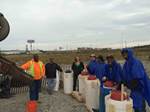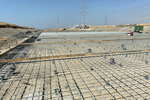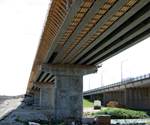Gatorbar, NEG, ExxonMobil join forces for composite rebar
ExxonMobil’s Materia Proxima polyolefin thermoset resin systems and glass fiber from NEG-US is used to produce GatorBar, an industry-leading, glass fiber-reinforced composite rebar (GFRP).

Composite rebar being installed. Photo Credit: ExxonMobil
ExxonMobil subsidiary Materia (Pasadena, Calif., U.S.), (Shelby, N.C., U.S.) and (Ahmeek, Mich., U.S.) have formed a strategic alliance committed to increasing the market share of composite rebar within the concrete reinforcement sector.
ExxonMobil’s Materia polyolefin thermoset resin systems, and glass fiber from NEG-US, is used to produce GatorBar, an industry-leading, glass fiber-reinforced composite rebar (GFRP). Data from ASTM tensile strength tests demonstrate that GatorBar is 2-4 times stronger than steel, making it suitable for a broad range of building and construction applications.
GatorBar is also 4-7 times lighter than steel, resulting in significantly improved handling and ease of use characteristics. This creates opportunities for total project savings through reduced labor and decreased shipping costs. GatorBar’s corrosion resistance improves maintenance and longevity of the concrete in which it is used.
The ultra-low viscosity and snap cure of Proxima, paired with the proprietary process technology of GatorBar and the consistency of NEG’s glass fiber and roving, reportedly enables production speeds up to 20 times faster than traditional composite rebar. This process efficiency is said to make GatorBar one of the most economic composite rebars on the market and a cost competitive alternative to most steel rebar.
The proprietary sizing technology of NEG-US glass fiber and the rapid wetout in the Proxima resin systems reportedly enables GatorBar to have composite mechanical properties superior to steel in tensile strength at a substantially lighter weight. NEG also leverages its glass chemistry expertise to target a composition that strengthens GatorBar’s resistance to corrosion.
“As well as expanding our manufacturing capacity recently by more than twofold, this new strategic alliance has been established with partners making the same level of aligned commitment to capitalize on the tremendous potential of the rebar market,” says Erik Kiilunen, CEO of GatorBar. “We look forward to ongoing collaboration with ExxonMobil and NEG-US as we mainstream GatorBar within the building and construction industry.”
Related Content
-
Award-winning Oder river bridge cuts 500 tons of steel with CFRP tension cables
Developed by Carbo-Link and tested by Empa, the Oder Bridge near Küstrin is a heavy rail bridge using 88 CFRP tension members, enabling 120 km/hr train speeds with reduced weight and emissions.
-
CSub delivers one-piece composite truss bridge in Norway
EPC supplier has fabricated, transported and delivered a 42-meter composite bridge intended for pedestrians and bicyclists.
-
Swedish parking garage to incorporate decommissioned wind blades
Architect Jonas Lloyd is working with Vattenfall to design the multistory building with a wind blade façade, targeting eco-friendly buildings and creative ways to remove blades from landfills.






